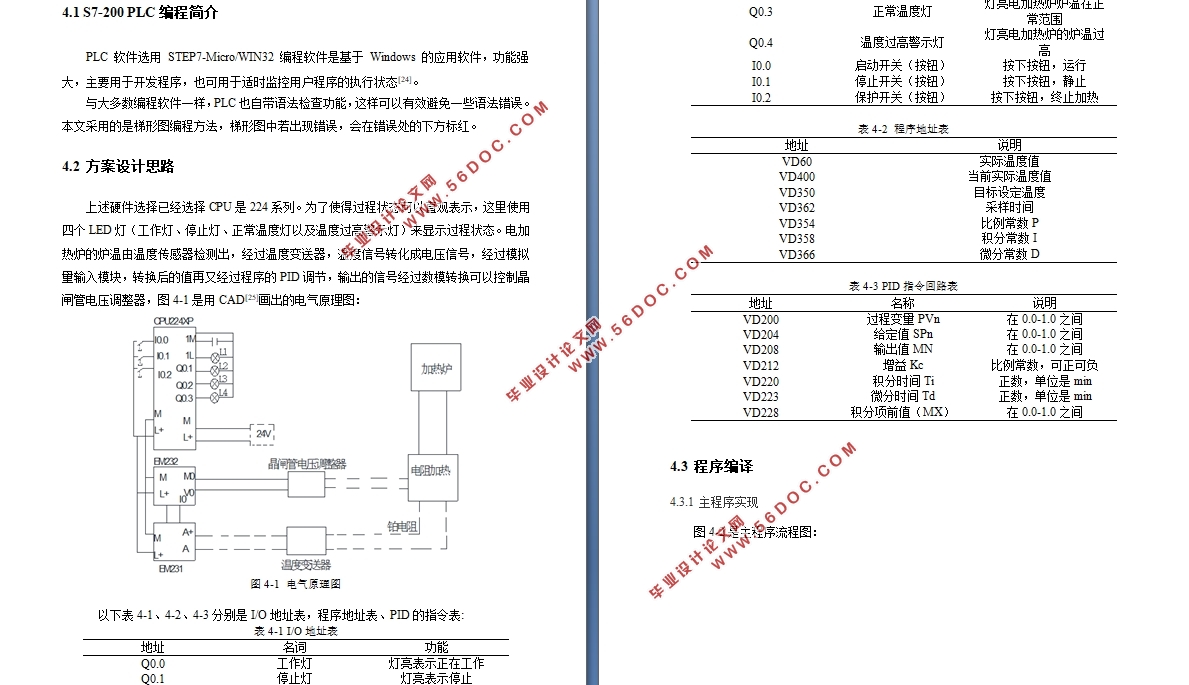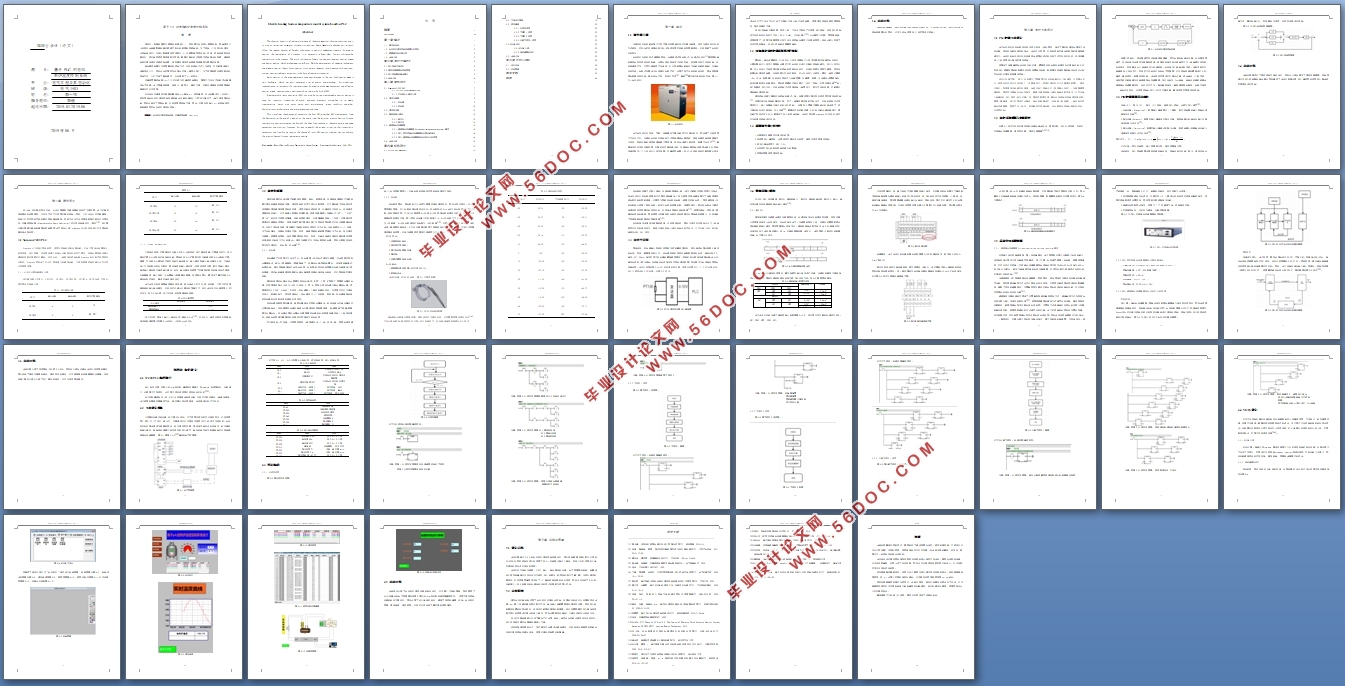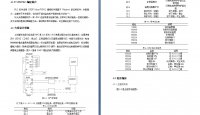基于PLC的电加热炉温度控制系统设计(任务书,开题报告,外文翻译,论文说明书11000字)
摘 要
温度这一物理量是较为重要的物理量之一,同时是工业反应中重要参数,某些温度大小的变化会直接影响到催化燃烧产物中的有害物质残留量。为了控制一个过程中的温度,必须知道在这个过程中影响温度因素有什么。主要影响因素包括:环境、控制系统和加热器设计,而这些因素使得建模较为困难。随着计算机技术和现代控制理论的发展,模糊控制在处理非线性系统控制问题,特别是在温度控制领域发挥着更为重要的作用。
继电器控制是以往使用最多的控制方式,这样的控制方式十分落后,不仅能源消耗大,消耗很多人力,同时也会对居民生活带去不便(噪声污染)。为了使得有更加便利有效的控制方式,人们开始了新的研究,如此便有了PLC的诞生。
可编程逻辑控制器(PLC)又可以称为可编程控制器件,是用于工业生产的数字运算操作电子系统。由于其编程简易、体积小、噪声小、维护方便、可靠性强等特性使得其越来越被认可以及使用。
这次会从选择温度传感器到最后的PID算法PLC程序编程,从头到尾进行一次设计。同时原始电加热炉温度控制系统的基本功能的基础之上同时又增加了一些方便实用的功能,同时也简化了原有电路,这样使得其控制方便、灵活。只要改变输入PLC的控制程序,就能够实现对电加热炉温度的控制。
关键词:电加热炉温度控制系统,可编程控制器,CAD,PID。
Electric heating furnace temperature control system based on PLC
Abstract
The physical quantity of temperature is one of the more important physical quantities, and it is also an important parameter in industrial reaction. Some temperature changes will directly affect the residual amount of harmful substances in catalytic combustion products. In order to control the temperature of a process, it is necessary to know what factors influence the temperature in the process. The main influencing factors include environment, control system and heater design, which make modeling difficult. With the development of computer technology and modern control theory, fuzzy control plays a more important role in dealing with nonlinear system control problems, especially in the field of temperature control.
Relay control is the most commonly used control mode in the past. Such control mode is very backward, which not only consumes a lot of energy and manpower, but also brings inconvenience to residents' life (noise pollution).In order to make more convenient and effective control mode, people started a new research, so there is the birth of PLC.
Programmable logic controller (PLC) can also be called programmable control device, is used for industrial production of digital operation electronic system.Due to its simple programming, small size, small noise, easy maintenance, strong reliability and other characteristics make it more and more recognized and used.
This time from the selection of sensors to the final PID algorithm PLC programming, from the beginning to the end of a design.At the same time the original electric heating furnace temperature control system on the basis of the basic functions and at the same time to add some convenient and practical functions, but also to simplify the original circuit, so that its control is convenient and flexible.As long as the change of input PLC control program, you can achieve the electric heating furnace temperature control.
Key words: Electric Heating Furnace Temperature Control System,Programmable Controller,CAD,PID。


目 录
摘要 I
Abstract II
第一章 绪论 1
1.1 研究的目的 1
1.2 电加热炉温度控制系统国内外现状 2
1.3 课题研究的主要内容 2
1.4 本章小结 3
第二章 温控方案设计 4
2.1 PLC控制方案设计 4
2.2温控系统框图与控制原理 4
2.3 PID控制器的基本概念 5
2.4本章小结 6
第三章 硬件设计 7
3.1 Siemens s7-200 PLC 7
3.1.1 s7-200主要功能模块介绍 7
3.1.2开关量 I/O模块介绍 7
3.2 温度传感器 9
3.2.1 热电偶 9
3.2.2 热电阻 10
3.3 温度变送器 12
3.4 模拟量输入模块 13
3.4.1 EM 231 13
3.4.2 EM 232 14
3.5 晶闸管电压调整器 15
3.5.1 晶闸管电压调整器Silicon controlled voltage regulator概述 15
3.5.2 ZK-1型可控硅电压调整器的主要性能指标 16
3.5.3 ZK-1晶闸管电压调整器在电加热炉中的应用 16
3.6 本章小结 18
第四章 软件设计 19
4.1 S7-200 PLC编程简介 19
4.2 方案设计思路 19
4.3 程序编译 20
4.3.1 主程序实现 20
4.3.2子程序1实现 23
4.3.3子程序2实现 24
4.3.4 中断子程序1实现 25
4.4 MCGS设计 28
4.4.1 MCGS介绍 28
4.4.2 组态画面的设计 28
4.5 本章小结 32
第五章 总结与展望 33
5.1 设计总结 33
5.2 未来展望 33
参考文献 34
致谢 36
|





